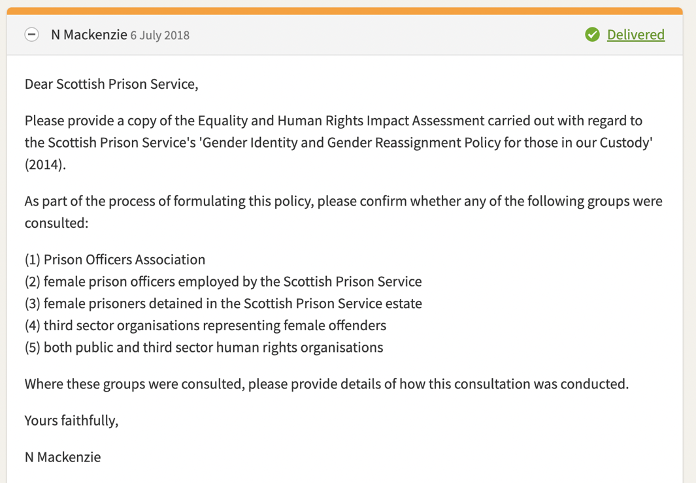THREAD. On 6 July 2018, we submitted a FOI request to the Scottish Prison Service (SPS) asking for sight of the equality impact assessment undertaken on their trans prisoner policy.
whatdotheyknow.com/request/equali…
whatdotheyknow.com/request/equali…

The SPS lists all equality impact assessments (EQIA) they have carried out on their website. No EQIA was listed for the trans prisoner policy. That is still the case today.
sps.gov.uk/Corporate/Abou…
sps.gov.uk/Corporate/Abou…
The SPS responded to the FOI request on 1 August 2018, with a copy of the EQIA.
whatdotheyknow.com/request/496110…
whatdotheyknow.com/request/496110…
The response showed that the policy had been under development since 2007. It listed details of those who had been involved in the EQIA. (Teresa Medhurst, then governor of HMP Edinburgh, is now SPS CEO.) 

Later, an independent researcher discovered that the metadata from the final policy document revealed its author as James Morton, Manager of the Scottish Trans Alliance, who was also consulted as part of the EQIA.
scottish-women.com/2018/09/12/sco…
scottish-women.com/2018/09/12/sco…
The EQIA showed which groups had been consulted as part of the process. The Scottish Trans Alliance and Stonewall Scotland were consulted but no women’s groups were consulted. 

The EQIA stated that: “SPS could be at risk of corporate discrimination if they miss manage [sic] a transgender person.” 

The evidence they cited included a 2012 report by trans activist organisation GIRES, which was co-authored by James Morton of the Scottish Trans Alliance. The report does not make any reference to prisons. gires.org.uk/wp-content/upl… 

The EQIA also referenced a 2012 report from Gendered Intelligence, which also makes no reference to prisons.
web.archive.org/web/2015031619…
web.archive.org/web/2015031619…

The EQIA evidence also referenced the Yogyakarta Principles, which are not legally binding.
murrayblackburnmackenzie.org/2022/06/20/gen…
murrayblackburnmackenzie.org/2022/06/20/gen…

It asks “Which equality groups will be affected by the new or revised policy/practice?” and lists nine protected characteristics under Equality Act 2010, although it gets two of those wrong, using ‘gender’ instead of ‘sex’ and ‘gender identity’ instead of ‘gender reassignment’. 

The EQIA concludes that only those with the protected characteristics of ‘age’, ‘gender identity’ and ‘sexual orientation’ will be affected by the policy.
The section on the Public Sector Equality Duty concluded that there would be no adverse effects on any groups. 

Further consideration of the impact of the policy was mostly concerned with how it would impact on trans prisoners. 

It states: “There are people in prison for transphobic crimes”. Mitigation: “SPS have a duty of care and will take steps. A trans person should not have any contact or be in the same location at any time with a person who has been charged or sentenced to a transphobic crime.”
It states: “There are vulnerable people in prison when faced by a trans person (pre operation) might induce fear to that person”. Mitigation: “SPS will take steps to support vulnerable and trans people.”
There is a brief reference to risk assessments: “SPS is aware of the risks presented by trans people and before making a decision have to be aware of all risks. A comprehensive risk assessment will give the SPs protection and protection to the trans person.”
The course of action suggested by the EQIA is “Outcome 2: Proceed with adjustments to remove barriers identified or to better promote equality”. Note that the EQIA does not seem to conclude that the threshold for Outcome 1 has been met. 

The EQIA concludes: “There is no direct evidence that this policy will be discriminatory or will breach any article or protocol in the Human Rights Act.”
And “the new process should not have a detrimental effect on any protect [sic] characteristics in the Equality Act or any Human Rights Articles.” 

In the section on how the policy should be monitored and reviewed, it states that SPS should “Support trans case conference in prison” and “Monitor numbers of trans people, monitor complaints from trans people”. 

When the policy was launched in 2014, the Scottish Prison Service, working with the Scottish Trans Alliance and Equality Network, produced two videos to demonstrate aspects of the policy in practice.
• • •
Missing some Tweet in this thread? You can try to
force a refresh







